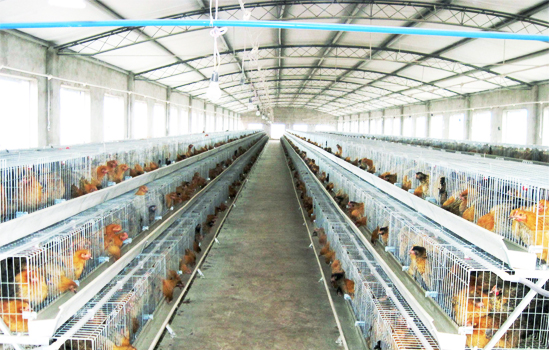What should be paid attention to in chicken cages in summer?
- font size decrease font size increase font size
Seasonal changes have a great impact on chickens raised in chicken battery cages. Unsuitable chicken farming methods can seriously impede the production of chickens and the economic benefits of farmers. There are many things to watch out for as the season changes, especially in the summer. The following authors will take you to know what to pay attention to in summer.
1. Reduce energy feed
In the summer, the hen enters the peak of laying eggs. To achieve good economic benefits, it is necessary to pay attention to adjusting the nutrient composition of the chicken feed in time to ensure the perfection and sufficient nutrition of the diet. Practice has shown that the temperature is closely related to the feed intake of the chicken, and like all poultry, the chicken is “feeding according to energy”. Therefore, the adjustment of chicken feed ingredients must follow the following principles:
The summer temperature gradually rises. If you continue to feed the high-energy feed during the winter, the weight of the laying hen will increase, which will affect the egg production rate. The scientific approach is to reduce the proportion of cereal feeds such as corn in the diet.

2. Improve protein levels
The hen consumes more protein during the laying period, and its consumption is related to the egg production rate of the chicken. Therefore, the protein raw material in the chicken feed should be increased according to the increase of the egg production rate of the chicken. The method is to add high-quality fishmeal, bean cake, etc. in the diet, and to minimize the amount of chowder when the cost permits.
3. Improve mineral content
When the hen lays eggs, the demand for calcium increases. For example, the calcium deficiency in the chicken feed will affect the quality of the eggshell, thus increasing the broken egg, which will cause the chicken to have soft shell eggs and shellless eggs. Phosphorus deficiency, like calcium deficiency, can also cause discomfort in laying hens, such as cockroaches, cockroaches, and quail eggs. Therefore, once the laying hens are found to have indigestion, loss of appetite, weight loss, etc., the cause should be identified and the content of mineral additives in the diet should be increased accordingly.
4. Vitamin supplements
Especially vitamin D, when the diet is chronically deficient, the egg production of the laying hens decreases, the eggshell becomes soft and thin, and the absorption of calcium is also seriously affected. When the number of chickens is increased, the vitamin consumption is also increased. Therefore, some green fodder can be properly fed, and the amount of multivitamin in the chicken feed can be increased.
